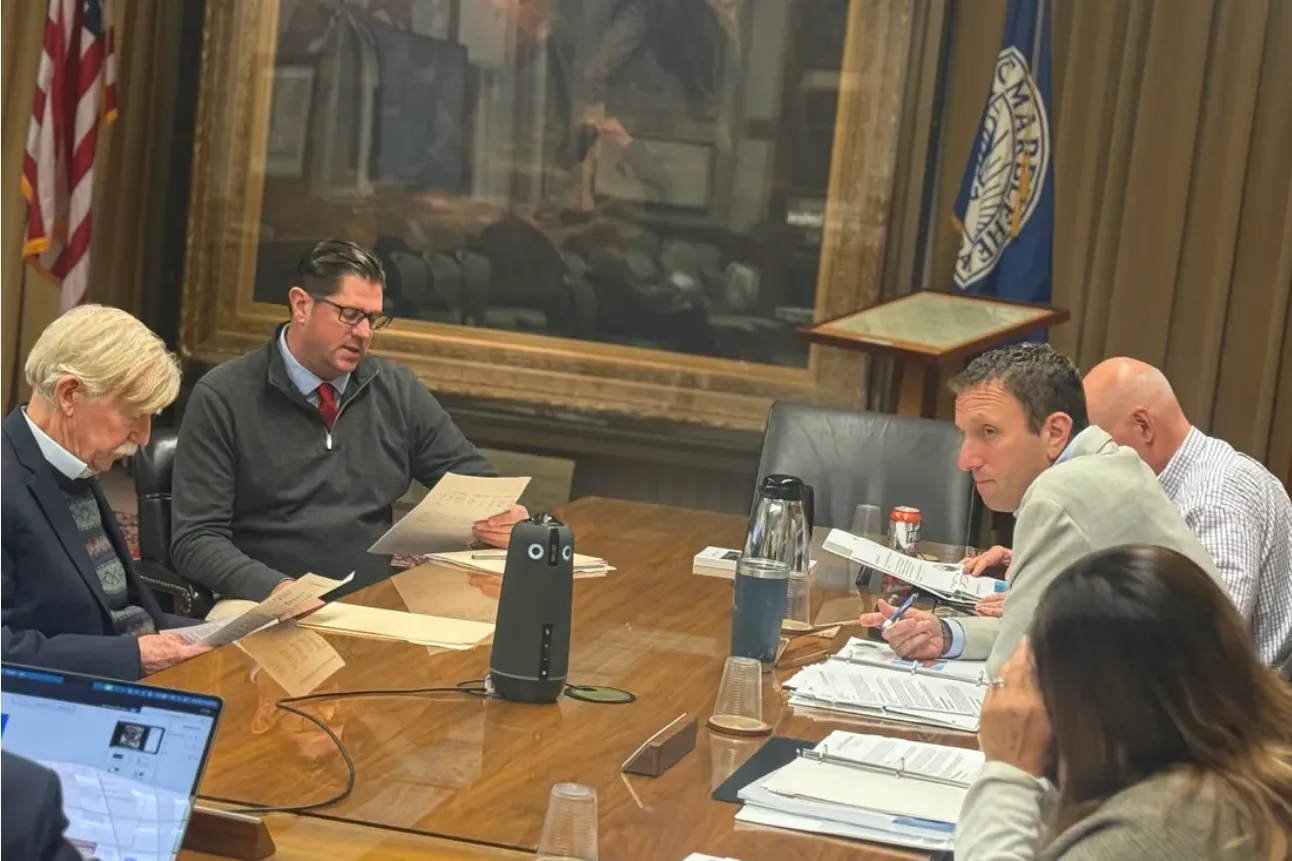Table of Contents
We make sense of what’s decided in meeting rooms — and what it means for ‘Headers. Join 01945 readers who prefer context over noise. Sign up for The Independent’s newsletter ›
When consultant Parker Elmore told Marblehead’s Select Board in October that the town is “liable” for $142 million in unfunded retiree health benefits, he was describing more than a local budget problem. He was pointing to a statewide policy challenge that leaves Massachusetts municipalities trapped between rising costs and vanishing options.
That figure came from an actuarial report prepared by Odyssey Advisors, the firm that Elmore leads. According to the report, Marblehead’s total OPEB liability stands at roughly $142 million, offset by about $4.95 million in trust fund assets — a funding ratio of 3.37%.
Marblehead’s low ratio places it among the lower tier of Massachusetts municipalities in terms of OPEB preparedness, but the problem isn’t primarily local. State law defines who qualifies for retiree health benefits, fixes the employer contribution rate at 50% and prevents towns from changing coverage levels or eligibility without legislative approval.
“Massachusetts is a top-down state — it takes away most of the tools communities might use,” Elmore said during his presentation.
Underfunding reflects statewide pattern
Marblehead began setting money aside for retiree health benefits in 2010, when Town Meeting created a dedicated OPEB trust fund. Since then, annual deposits have ranged from $250,000 to $750,000 — “steady but limited,” according to Finance Department reports.
Actuarial data show 748 retirees and spouses receive town-paid health benefits costing $6.9 million a year, about 3.5 % of the municipal budget. Another 645 active employees are earning future benefits, adding to the long-term obligation.
Budgets and obligations can feel abstract — until someone connects the dots between yesterday’s votes and tomorrow’s bills. That’s the Independent’s job. Join fellow ‘Headers who value context over noise ›
Parker Elmore, president of Odyssey Advisors, which consults for more than 900 public entities, said Marblehead lags behind similar communities. Danvers has saved $27.1 million toward $92.7 million in liabilities, reaching a 29.23 % funding ratio, while Newburyport stands at 13.37 %.
In fiscal 2024, Marblehead paid $6.9 million directly from its operating budget for retiree health premiums — a “pay-as-you-go” approach that covers current costs but does little to reduce future debt.
Those choices reflect a constant trade-off: every dollar set aside for OPEB is a dollar not spent on schools, roads or public safety — or one that could require higher taxes. Select Board member Moses Grader noted that most Massachusetts towns fund less than 10 % of their OPEB liabilities, calling it “a statewide balancing act between promises made and services needed.”

Elmore urged officials to view pensions and OPEB as “a combined retirement budget,” saying towns can manage both more effectively when planned together. But he cautioned that progress depends on several conditions — pension funds must reach full funding first, health-care costs must stay stable and investment returns must meet expectations.
Invisible costs create long-term pressure
The Odyssey Advisors report cautioned that OPEB costs “will continue to rise significantly over the next 30 years” if the town maintains its current contribution schedule. Projections presented to the board show Marblehead’s total OPEB liability growing from $142 million in 2024 to about $186 million by 2034 and potentially exceeding $300 million by 2054.
That slow build makes the liability easy to overlook politically but significant financially. As the town’s Finance Department noted in its 2024 management discussion, retiree health costs “continue to place pressure on the operating budget” and compete with other long-term priorities.
“You can’t change how long people live,” Elmore said during the presentation. His point: demographic reality and health inflation are beyond any town’s control, yet the financial responsibility sits squarely on local books.
That structural imbalance is built into Massachusetts law. The state determines the benefit formula, but towns are legally responsible for paying it. No statewide pool or cost-sharing mechanism exists, leaving communities like Marblehead to manage multi-decade liabilities with limited flexibility.
A structural challenge, not a local failure
The Finance Committee’s budget guidelines for the past decade have included a standard appropriation to the OPEB Trust, which reached $7.2 million as of June 30, 2024, according to audited financial statements.” Alison Nieto, the former fiance director, wrote in the town’s 2016 financial report that Marblehead’s strategy was “to steadily build the OPEB trust fund while maintaining service levels for residents” — a description that still fits the town’s approach nine years later.
The Independent shows up for the meetings so you don’t have to. Your membership makes that possible — every late-night vote, every quiet decision, every follow-up that keeps leaders honest. Become a member ›
The Essex Regional Retirement Board, which oversees the pension plan serving Marblehead employees, reports that the system is about 98% funded. That contrast highlights the core distinction between the two obligations. Pension liabilities are pooled regionally and supported by investment rules designed for full funding. OPEB liabilities remain purely local, dependent on each community’s ability and willingness to save.
Elmore reminded the Select Board that “the more money you put in, you have more money to earn,” but acknowledged the difficulty of doing so under Proposition 2½, which caps annual property tax increases at 2.5%.
Looking ahead
For now, Marblehead’s plan is to stay the course. The fiscal 2025 budget includes another $750,000 transfer to the OPEB Trust, continuing the gradual funding pattern described in the town’s financial forecasts.
But the larger question extends beyond local budgets. Massachusetts remains one of the few states where municipalities are required to fund retiree health insurance without any shared financing or flexibility in benefit design. Unless Beacon Hill acts, towns will continue managing liabilities they cannot fully control.
For Marblehead, those choices now define the path forward: $142 million owed, $7 million saved and a slow climb toward solvency that depends as much on state law as on local will.







